Add this eBook to your basket to receive access to all 124 records. Our indexes include entries for the spelling da. In the period you have requested, we have the following 124 records (displaying 1 to 10): These sample scans are from the original record. You will get scans of the full pages or articles where the surname you searched for has been found. Your web browser may prevent the sample windows from opening; in this case please change your browser settings to allow pop-up windows from this site. Inhabitants of Cheshire and North Wales
(1300-1309)
The county of Cheshire had palatine status, being in some measure independent of the rest of England: moreover, from the Statute of Wales of 1284, after king Edward's subjugation of North Wales, until the union of England and Wales in 1536 to 1543, much of the administration of North Wales (county Flint in particular) was directed from Chester. When the Chester Recognizance Rolls were moved from Chester to the Public Record Office, they were placed among the Welsh Records. These rolls, so called because they do include recognizances (of debts &c.) among their contents, are in fact the Chancery Rolls of the palatinate, containing enrolments of charters, letters patent, commissions and other documents issued under the seal of the palatinate. Deeds and other evidences of a private nature were also enrolled on them. A calendar of the Recognizance Rolls from their commencement to the end of the reign of Henry IV was prepared by Peter Turner and included in the 36th Annual Report of the Deputy Keeper of the Public Records in 1875. We have now indexed this, dividing the enrolments into decades. This is the period from the 29th year of the reign of king Edward I to the 3rd year of king Edward II. | Sample scan, click to enlarge
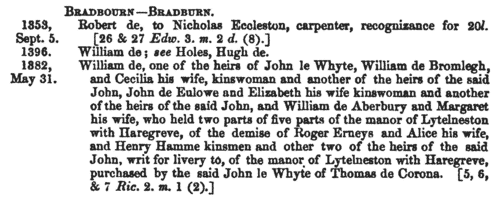
| Grantees of offices, commissions and pardons
(1317-1321)
The Patent Rolls are the Chancery enrolments of royal letters patent. Those for the 11th to the 14th years of the reign of king Edward II (8 July 1317 to 7 July 1321) were edited for the Public Record Office by G. F. Handcock, and published in 1903. The main contents are royal commissions and grants; ratifications of ecclesiastical estates; writs of aid to royal servants and purveyors; and pardons. Most extensive are the commissions of oyer and terminer to justices to investigate complaints about specific crimes and wrongs in particular counties. | Sample scan, click to enlarge

| Liegemen and Traitors, Pirates and Spies
(1591-1592)
The Privy Council of queen Elizabeth was responsible for internal security in England and Wales, and dealt with all manner of special and urgent matters
| Sample scan, click to enlarge
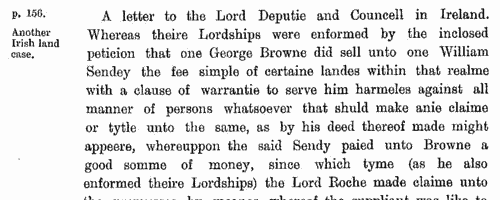
| Liegemen and Traitors, Pirates and Spies
(1591-1592)
The Privy Council of queen Elizabeth was responsible for internal security in England and Wales, and dealt with all manner of special and urgent matters
| Sample scan, click to enlarge
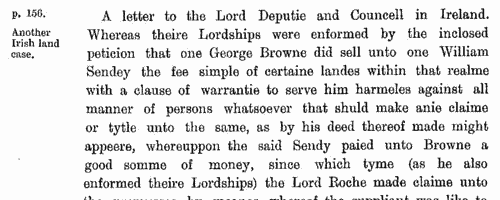
| Official Papers
(1670)
The State Papers Domestic cover all manner of business relating to Britain, Ireland and the colonies, conducted in the office of the Secretary of State as well as other miscellaneous records. Includes lists of passes to travel abroad. There is also some material in this source from 1660 to 1669.
| Sample scan, click to enlarge

| Allegations for marriages in southern England
(1679-1687)
The province or archbishopric of Canterbury covered all England and Wales except for the northern counties in the four dioceses of the archbishopric of York (York, Durham, Chester and Carlisle). Marriage licences were generally issued by the local dioceses, but above them was the jurisdiction of the archbishop, exercised through his vicar-general. Where the prospective bride and groom were from different dioceses it would be expected that they obtain a licence from the archbishop; in practice, the archbishop residing at Lambeth, and the actual offices of the province being in London, which was itself split into myriad ecclesiastical jurisdictions, and spilled into adjoining dioceses, this facility was particularly resorted to by couples from London and the home counties, although there are quite a few entries referring to parties from further afield. The abstracts of the allegations given here usually state name, address (street in London, or parish), age, and condition of bride and groom; and sometimes the name, address and occupation of the friend or relative filing the occupation. Where parental consent was necessary, a mother's or father's name may be given. The ages shown should be treated with caution; ages above 21 tended to be reduced, doubtless for cosmetic reasons; ages under 21 tended to be increased, particularly to avoid requiring parental consent; a simple statement 'aged 21' may merely mean 'of full age' and indicate any age from 21 upwards. These are merely allegations to obtain licences; although nearly all will have resulted in the issuing of the licence, many licences did not then result in marriage. | Sample scan, click to enlarge

| Treasury Books
(1689-1692)
Records of the Treasury administration in Britain, America and the colonies.
| Sample scan, click to enlarge
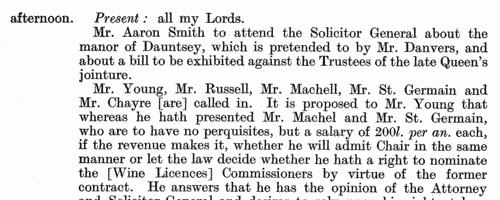
| House of Lords Proceedings
(1697-1699)
Private bills dealing with divorce, disputed and entailed estates: petitions, reports and commissions: naturalisation proceedings.
| Sample scan, click to enlarge
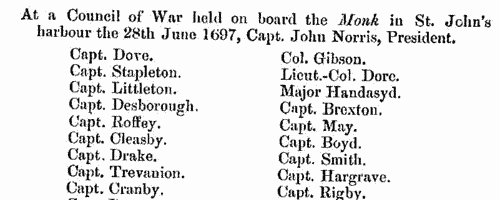
| Official Papers
(1703-1704)
The State Papers Domestic cover all manner of business relating to Britain, Ireland and the colonies, conducted in the office of the Secretary of State as well as other miscellaneous records. Includes lists of passes to travel abroad. June 1703 to April 1704.
| Sample scan, click to enlarge
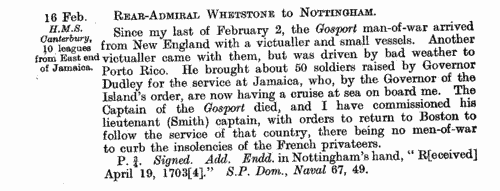
| Treasury and Customs Officials, Officers and Pensioners
(1711)
Government accounts, with details of income and expenditure in Britain, America and the colonies
| Sample scan, click to enlarge
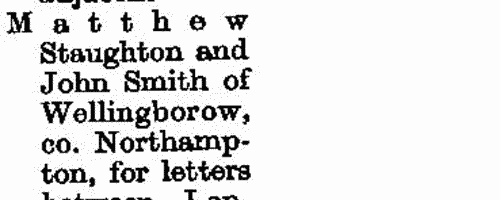
|
Research your ancestry, family history, genealogy and one-name study by direct access to original records and archives indexed by surname.
|











